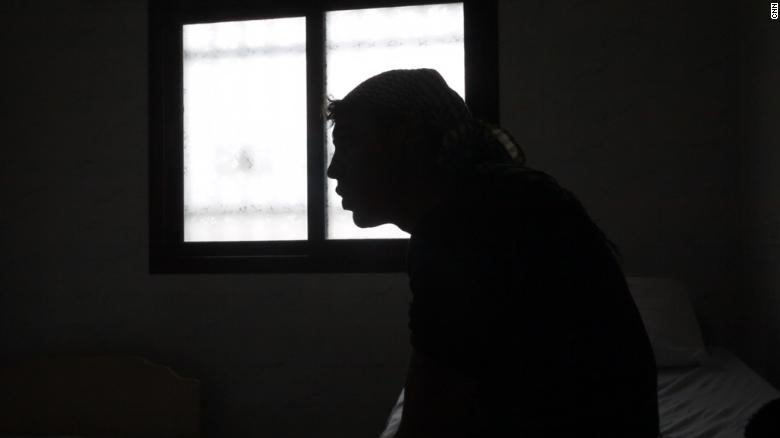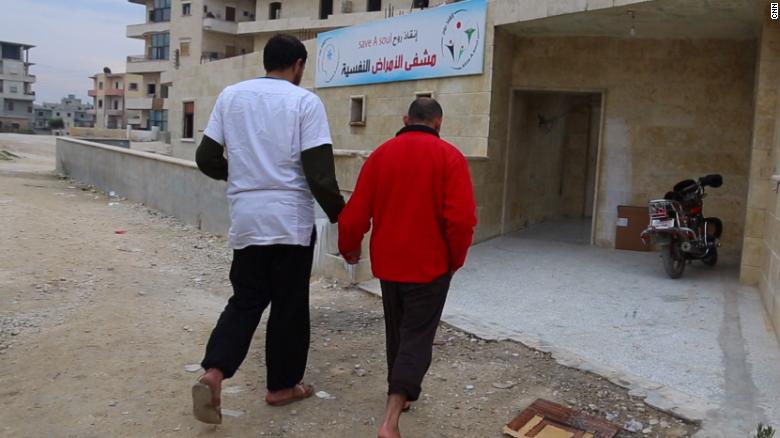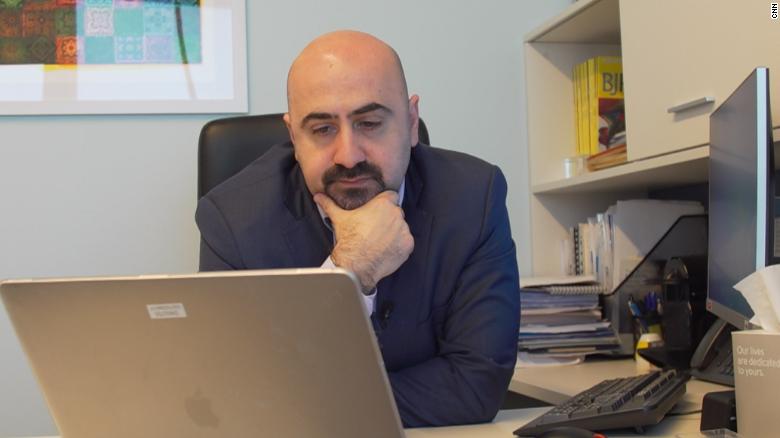
From the Website of CNN NEWS
links: https://edition.cnn.com/2019/01/24/health/idlib-rehab-center-intl/index.html
The wartorn region where even some 10-year-olds are hooked on opioids
(CNN)His lower arms scarred from where he repeatedly cut himself, 23-year old Mahmoud recalls his daily drug habit.
"I'd take 30 pills first thing in the morning. Half an hour after breakfast I'd take another 20, then another 20 in the afternoon, and in the evening when I went out another 30 or 40. As many as 150 by the end of the day."
Mahmoud is one of dozens of people who have come seeking help from the Save a Soul Hospital for Mental Illnesses, the only drug rehabilitation center in Syria's rebel-controlled Idlib Province.
His drug of choice: Tramadol, a highly addictive opioid, cheap and freely available over the counter in Syria.
When Mahmoud was high -- which was all the time -- he says he would cut his arms with a knife. "I couldn't feel a thing," he recalls.
In the war-ravaged wasteland that is Syria, no one has gathered statistics on drug abuse.
The doctor who runs the hospital, who requested that his name not be published for fear of reprisals, says substance abuse has skyrocketed since the start of the war.

Mahmoud says he would take as many as 150 pills a day.
"We're seeing addiction starting with children who are 10, 11 or 12 years old," he says. "Addiction is supposed to start later, at the age of 18 or 19 or 20, but because of the breakup of families it's starting at an early age."
About 1 million people have fled to Idlib from other parts of Syria as the government has regained control of areas previously dominated by the armed opposition. With the exception of the third of Syria still controlled by US-backed, predominantly Kurdish forces, it's the last part of the country still dominated by anti-regime fighters.
An uneasy truce now reigns in Idlib. Last autumn, Syrian government forces were poised to launch an offensive to retake the province, but an agreement last September between Turkey and Russia prevented that from happening. Idlib's final reckoning, however, seems to be only a matter of time. The province is dominated by Hay'at Tahrir Ash-Sham, formerly known as Jabhat al-Nusra, the Syrian affiliate of al Qaeda.
Ravaged by war, with a population swelled by the displaced and the prospect of more violence to come, any escape, mental or physical, has an understandable attraction.

An unnamed patient enters rebel-held Idlib's only rehabilitation center for drug addicts.
"They will make you happy," an old schoolmate promised Mahmoud, offering him his first pills of Tramadol.
"With the problems at home," says Mahmoud, "I took more and more. I didn't have any work and was always fighting with my father. I smashed all the windows in our home. I cut myself. In the end, my father locked me up, and once even chained me."
"I always heard someone speaking in my head," he says, scratching his arms.
The demons in Mahmoud's head are finding a home in Idlib.
Dr. Joseph El-Khoury, a psychiatrist at the American University of Beirut's Medical Center (AUBMC), is an expert on opioid abuse. "They're bored," he told CNN after watching the interview with Mahmoud and other addicts in Idlib. "They're sitting there, not much hope happening for them, and there's this promise of a chemical heaven that is instant, and thus relief from everything around you."
 |
| Confusion reigns over America's impending Syria pullout |
Mohammed, 29, experienced that chemical heaven, and ended up in hell. He joined the fight against government forces in his town outside Damascus, and was wounded. A doctor prescribed Tramadol, but warned him to take the pills only when the pain was unbearable.
Shrapnel has disfigured his upper chest. It was a bad wound, he recalls. He took to popping dozens of Tramadol at a time.
"I needed it a lot, so I took a lot. I became addicted. I couldn't live without it. For two years I took the pills."
And during those two years, his life went down the drain.
"I couldn't sleep, I couldn't eat. I was always vomiting, always nervous, always shaking," he recounts.
Back to battle
Staying for weeks in hospital, Mohammed received counseling and support and was weaned off the drugs.
What are his plans once his treatment ends?
"I want to return, God willing, to fighting," he says.
Which means he will be back among his old comrades, many of whom are already on drugs, either opioids to dull the pain, or amphetamines to stay alert while in harm's way.

Dr. Joseph el-Khoury watches Idlib's drug users' testimonies.
"The chance of him falling again into some form of dependence is easily above 50%, even with support," said AUBMC's Dr. El-Khoury.
In a situation where the chances of death are high, the attitude among many is "take drugs, for tomorrow we shall die."
"When you're fighting in Aleppo," said El-Khoury, "and the world around you is collapsing, and you don't where you are going to end up at the end of the day, what are the mechanisms that are going to prevent you from seeking that chemical promise that this medication is bringing you?"
It's a "promise" that's ruining lives in a country already ruined by war.
Shrapnel has disfigured his upper chest. It was a bad wound, he recalls. He took to popping dozens of Tramadol at a time.
"I needed it a lot, so I took a lot. I became addicted. I couldn't live without it. For two years I took the pills."
And during those two years, his life went down the drain.
"I couldn't sleep, I couldn't eat. I was always vomiting, always nervous, always shaking," he recounts.
Back to battle
Staying for weeks in hospital, Mohammed received counseling and support and was weaned off the drugs.
What are his plans once his treatment ends?
"I want to return, God willing, to fighting," he says.
Which means he will be back among his old comrades, many of whom are already on drugs, either opioids to dull the pain, or amphetamines to stay alert while in harm's way.

Dr. Joseph el-Khoury watches Idlib's drug users' testimonies.
"The chance of him falling again into some form of dependence is easily above 50%, even with support," said AUBMC's Dr. El-Khoury.
In a situation where the chances of death are high, the attitude among many is "take drugs, for tomorrow we shall die."
"When you're fighting in Aleppo," said El-Khoury, "and the world around you is collapsing, and you don't where you are going to end up at the end of the day, what are the mechanisms that are going to prevent you from seeking that chemical promise that this medication is bringing you?"
It's a "promise" that's ruining lives in a country already ruined by war.
CNN Website
Article Links
OTHER HUMAN RIGHTS PROMOTIONS WEBSITES
------------------------------------------------------------------------------------------------
THE GLOBAL WORLD PROMOTIONS
-------------------------------------------------------------------------------------------------
-------------------------------------------------------------------------------
---------------------------------------------------




































0 comments:
Post a Comment